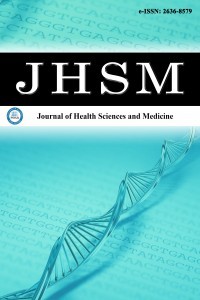
Journal of Health Sciences and Medicine
Yazarlar: Fatih GÜNEYSU, Ensar DURMUŞ
Konular:Sağlık Bilimleri ve Hizmetleri
DOI:10.32322/jhsm.971453
Anahtar Kelimeler:Covid-19,Acetylsalicylic acid,Prehospital,Antithrombotic
Özet: Objectives: In this study, we determine the prehospital antithrombotic drug use rates of patients in Covid-19 mortality to reveal the differences between patients using antithrombotic drugs and those who did not to show whether antithrombotic drugs impact the duration of stay in intensive care. Methods: This retrospective study was conducted with 291 patients admitted to the xxx University Training and Research Hospital emergency department between March 13 and December 1, 2020. Patients whose PCR test was positive and who died in our hospital were included in the study. Results: The median number of days in the intensive care unit of patients using acetylsalicylic acid (7; 3-11) was longer than patients who were not using acetylsalicylic acid (5; 1-10) (p=0.041). Also, the median days in the intensive care unit of patients who were not using any antithrombotic drug (5; 1-10) was shorter than patients who were using an antithrombotic drug (7;3-11) (p=0.032). There was no difference in patients using or not using other antithrombotic drugs (p=0.640) or acetylsalicylic acid and other antithrombotic drugs (p=0.979). Conclusion: This study shows that the prehospital use of aspirin has a positive effect on survival as it prolongs the length of stay in the intensive care unit. Since it is known that one of the most important causes of death in Covid-19 is hypercoagulopathy and considering the irreversible antiplatelet activity of aspirin and since this activity lasts for up to 10 days, the result seems reasonable.
Dergi editörleri editör girişini kullanarak sisteme giriş yapabilirler. Editör girişi için tıklayınız.